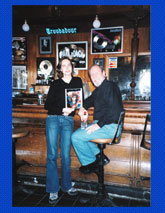INTERVIEWS INTRO
As a musician, listener, and responsible music journalist, I have spent decades immersed in all types and kinds of music, from sex-drenched rock 'n' roll, to brain-spinning jazz, to classical musics around the world, to sublime musics rooted in meditation. Some of these interviews touch upon personalities, but I have selected them because they also transcend personalities — they explore the profound and mysterious relationship of different kinds of music to the human psyche. They explore music's power at each level of psychological development in both the player and the receptive listener. And, in broad-strokes, they show the ways in which we can utilize music as a transformational tool in our own psychological and spiritual evolutionary development. Music is not only "out there." It is above all an
interior event for players and listeners alike that requires language and terminology appropriate to our psychological and spiritual life — our interiority.
I open the series with
Spacemusic, an interview I gave to Frankie Nemko-Graham in 1981, when certain musicians around the world were utilizing electronic synthesizers in new and exciting ways. They were transcending conventional song structures, melodies, harmonies, and rhythms and moving into aural-visual "soundscapes" that created potent psycho-spiritual contexts which receptive listeners found uplifting, inspiring, and spiritually energizing. It became a genre of music that flourishes to this day.
In
Liberate Your Ears, I explore musical "tastes," which tend to imprison us within the confines of our radio-oriented conditioning. I suggest that there are ways in which we can liberate ourselves from the barriers and restrictions of egoic "likes and dislikes." We can learn how to listen to all generic styles of music objectively — opening ourselves, receiving the music without reservation, moving into each music's particular "zone," experiencing the beauty and power of its generic qualities, and appreciating each music for what it is while seeking and finding individual artists who appeal to us within every genre (classical, jazz, rock, spacemusic, whatever). Ultimately, we can learn how to honor and utilize each style and level of music as a transformational psycho-spiritual tool. Musical "box thinkers" nearly always reject this approach, thereby refusing to learn and grow as individuals while simultaneously denigrating music they don't care for. They dismiss music that doesn't fit their "tastes" as "bad," simply because it fails to conform to their narcissistic demands. As listeners, they remain ignorant and imprisoned. Furthermore, their disrespect for generic styles outside of their narrow-minded experience impedes the evolutionary development of music itself. In my view, we should honor music and learn how to experience it deeply and transegoically at all of its many levels. Music can be infinitely more than entertainment.
In
The Spectrum of Music, I discuss this same subject nearly 30 years after I wrote "Liberate Your Ears," shedding additional light on the question of musical "levels" and the relationship of those levels to our growth and development. Although "Spectrum" is Part II of an interview by Derk Richardson, I place it immediately after "Liberate Your Ears" because the two pieces fit together well. This interview also touches on some of my personal predilections, which I rarely discuss in public.
In 1995, jazz musician Daryl Patrick was one of the first to interview me about singer-songwriter Tim Buckley, who, among other things, was a great improviser — hence,
Tim Buckley & Improvisation. It seems to me that the question of improvisation is profound. It demands absolute presence, self-transcendence, and unswerving loyalty to music's awesome power — one must be willing to
serve music, not merely exploit it for wealth or fame. Improvisation demands self-awareness, courage, and consciousness, all of which, of course, are qualities that play significant roles in daily life as well.
I wrote
Chronicle Of A Starsailor back in 1977, two years after Tim Buckley's death. It focuses on Buckley's life, his music, and his extraordinary evolutionary development through five conceptual periods: folk, folk-rock, jazz, avant-garde, and white-funk dance music. Until my book
Blue Melody was published in 2002, this article remained the definitive piece on Buckley's life and music. It holds up to this day.
In the
Blue Melody Pre-publication Interview, two Europeans, Toni Ruiz and Riny van Eijk, spoke with me about the evolution and development of my book,
Blue Melody: Tim Buckley Remembered, and about several issues in Tim's life and music — including substance abuse, producer Jerry Yester's role in recording
Happy Sad, the clash of art and commerce, and Tim's untimely demise.
In the
TB Overview, online journalist Jo Abolins asked good questions about Tim's life and work that examine the difficulties an innovative artist faces in the arena of conventional pop music. She also asked me to speculate about how Tim may or may not have developed had he lived beyond the age of 28, and to discuss the nature of business values and artistic drives.
I conclude with Part I of Derk Richardson's interview. In
Tim, Jeff & Blue Melody, Derk asked strong questions about Tim's death, the 25-year gap between Tim's death and the writing of my book,
Blue Melody, the reasons why Judy Buckley refused to cooperate, and how I feel about posthumous releases. That "posthumous" discussion led into a nutshell comparison of Tim and Jeff's styles and abilities, in which I do not take an "either/or" position, but objectively and compassionately delineate the qualities and strengths of each.

